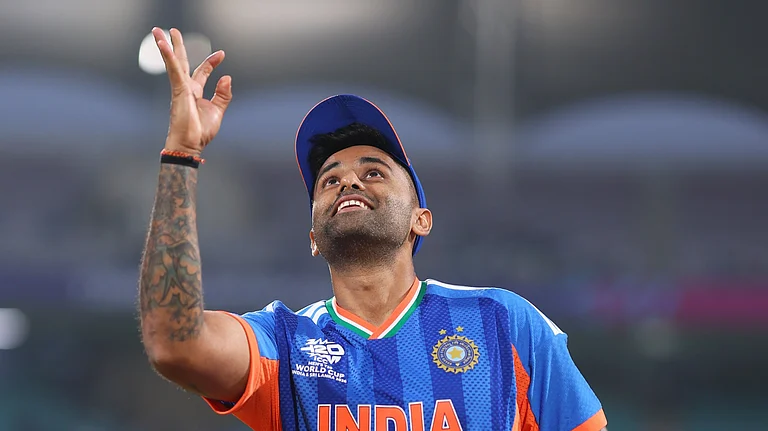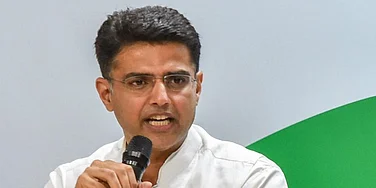As large hoardings with photos of Prime Minister Narendra Modi, Madhya Pradesh Chief Minister Shivraj Singh Chouhan, and several other Bharatiya Janata Party (BJP) leaders dot the streets of Bhopal, one can’t miss the ones with Ram Mandir in the background.
The evocation of Ram Mandir, which is going to be consecrated on January 22 at Ayodhya in the presence of lakhs of devotees and Modi, came up several times during the electoral campaigns. From Uttar Pradesh CM Yogi Adityanath to senior BJP leader Narottam Mishra, the high-decibel campaign highlighted the foundation of the temple as the biggest achievement of the party.
Notably, the Congress was not far behind. Not in a mood to take the risk of losing the fruits of anti-incumbency, Kamal Nath threw his hat into the ring and during an interview with national media asked people to recall who opened the gates of the Babri Masjid. It was Rajiv Gandhi who opened the Masjid complex for Hindus in a bid to pacify them at a time when his electoral fortune was hung by a thread following his decision to assuage Muslims after the post-Shah Bano demonstration. The opening of the gate, people believe, led to the demolition of the medieval-era mosque on December 6, 1992.
But do the sentiment of Ayodhya and Ram Mandir hold water in Madhya Pradesh, a state where BJP is not only suffering anti-incumbency but is also drowned in alleged corruption charges from Vyapam to the recent Patwari recruitments? The political analysts and the people on the ground think that communalism seems to have taken a backseat.
In the Adivasi-dominated regions, the efforts of the Rashtriya Swayamsevak Sangh (RSS) to spread Hindutva though worked in the last two decades, people’s necessity of roti, kapda, makaan override anything else, says Chandravan Banwar, one of the senior-most journalists of Jhabua, a district popularly known as the Adivasi capital of the state. The locals say that the Adivasi-dominated regions used to support Congress before 2000 but the failure of the Digvijay Singh government to develop the infrastructure paved the path for the RSS.
Since 2000, Sangh officials started reaching out to people across 1,326 villages of Jhabua and Alirajpur. The Adivasis —mostly belonging to the Bhil community— gradually got engaged in Hindu religious festivals and the Ganesh puja turned out to be one of the biggest of all, adds Banwar.
On January 17, 2003, the RSS held the Hindu Sangam in Jhabua where around 3 lakh Adivasis from the region joined. K S Sudarshan, the then-RSS chief, addressed the crowd and in the following assembly elections for the first time in the history of the region the BJP won all of the five seats.
Similar patterns of reaching out to people citing lack of development and then bringing them into the fold of the right-wing through ‘Dharma’ and ‘Jagaran’ had been replicated across different regions, note local journalists. However, the situation is different this time.
Several people think that the BJP’s efforts to sway away Hindu votes couldn’t work because of Nath’s devotion to Sanatan practices. While Nath sparked a controversy and was accused of peddling soft Hindutva for inviting Baba Bageshwar to his constituency, Chhindwara, the locals think it was nothing but his faith and this was in no way connected to ‘politics’. Mansoor, a resident of Chhindwara, in his late 40s, says, “It is his faith, and he can practice his beliefs without violating others’ rights. Muslims have no issue with it.”
Standing in front of the 101-foot Hanuman statue—which Nath founded in 2015, and has become a centre of attraction for the people—Ravishankar Shukla, the head priest, says, “Nath ji is extremely devoted to Hanuman ji. And there is no politics. It is a reflection of his devotion.” Rejecting the term “soft Hindutva”, Nath says, “I built the statue decades ago and it is a matter of my personal faith.”
But what about the Congress party’s apparent silence in Khargone, which witnessed communal violence last year—leading to the transformation of Chouhan’s image as a ‘bulldozer mama’ who allegedly razed the houses of several Muslims? One analyst, on condition of anonymity, says, “This is also strategic.”
Bhopal-based political strategist, Sulabh Singh, nevertheless, thinks that the Congress is banking on soft Hindutva as it doesn’t want to lose its core voter base. “Both Nath and Digvijay Singh portray themselves as devout Hindus. And they want to retain this image,” says Singh.
Though Rahul Gandhi has been very vocal about proportionate representation, the Congress has given only two tickets to Muslims — Bhopal Central and Bhopal North. Arif Masood, the sitting Congress MLA from Bhopal Central, points out, “We have focused on the winnability of the candidates. We want to form the government and it is necessary for us to field those candidates who have the maximum chance of winning.” Muslims comprise almost 7 per cent of the state’s population.
In Burhanpur, Congress wanted to field a Muslim candidate, but the political equation didn’t support this proposal. In 2018, this seat was won by Sher Singh Meena as an independent candidate, who later joined the Congress. “Singh was denied a ticket from the Congress in 2018, yet he won the seat as an independent. This time, the party didn’t want to take any risk,” says Jalal. There is also the possibility of the AIMIM gaining from this seat, he adds.
In this context, the allegations of soft Hindutva don’t hold much water, says Ansar Rehman, a district-level Congress leader. However, nobody knows when the final game to evoke the communal sentiments will be played. “It comes through WhatsApp just before the elections and this can influence the floating voters,” says Shahroz Afridi, a Bhopal-based senior journalist.























